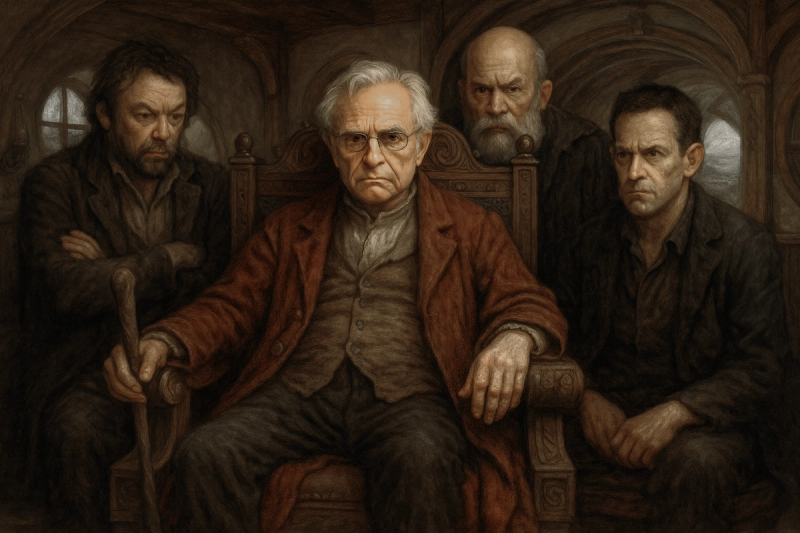If you've only seen The Lord of the Rings movie trilogy but not read the books, you might not know that the story of the Hobbits doesn't move straight from the final defeat of Sauron to their immediate return to a peaceful Shire happily ever after. There's a second-to-last chapter left out of the films, ominously titled, "The Scouring of the Shire."
In that chapter, the Hobbits discover on their way home that in their absence the Shire has been pillaged and subjugated by thugs following orders from a local Hobbit turned baron, who had bought and industrialized much of the land with money earned from selling pipe-weed to Saruman. More recently, a new boss had moved in, Sharkey, under whom the situation had grown even worse.
What does this have to do with atheism in general, or Richard Dawkins in particular, you might ask?
The returning Hobbits muster a militia to confront Sharkey and his men—in what is officially the final battle in the trilogy, the Battle of Bywater—and soundly defeat them. Afterward, Sharkey reveals himself to be Saruman—though fallen far from his earlier strength and status.
When I think of Richard Dawkins, I think of Sharkey.
Both Dawkins and Saruman fell from tremendous heights of power and influence. Dawkins was (and probably is) the most famous leader of the so-called "new atheism," a militant, vocally anti-religious movement usually associated with four prominent authors: Dawkins, along with Sam Harris, Daniel Dennett, and Christopher Hitchens.
Skepticism, Agnosticism, and Atheism
by Mollie Ziegler HemingwayHemingway offers a sweeping historical tour revealing how today’s “New Atheism” is anything but new, tracing skepticism, agnosticism, and atheism from Scripture and the ancient world through medieval, Renaissance, and Enlightenment shifts (including the faith–reason split) to modern political movements—reminding Christians that unbelief has always been with us, and always calls for the same faithful response.
These aggressive atheists, known as the "four horsemen of the new atheism," really ramped up their criticism of religion after the September 11th, 2001 terrorist attacks in New York and Washington DC. The four horsemen initially focused their fire mostly on Islam but quickly broadened their public critique of all faith and religion as not just irrational and out of touch but actively dangerous and harmful. These men wrote a number of best-selling books against religion in the mid-2000s and became massively influential through their writing, speaking, and debating.
What a lot of Christians may not realize is that the outsized influence of committed atheism in the broader culture has really dried up since the mid-2010s. Part of the reason is that the four horsemen broke up or lost credibility. Hitchens died in 2011. Dennett died last year. Dawkins is often still the go-to atheist for media interviews or debates, but he has lost tremendous credibility among fellow atheists.
The Challenge of the New Atheism
by Adam S. FranciscoFrancisco shows how the “New Atheists” advance a conversion-minded naturalism—treating God’s existence as a scientific hypothesis, dismissing classical cosmological/design and moral arguments, and recasting religion as harmful. Francisco shows how their case rests on prior naturalist assumptions and that Christians should answer with rigorous apologetics anchored in Christ’s historical resurrection.
This brings me to the main reason I think of Sharkey when I think of Dawkins: both men enjoy the fruits of the beliefs and values of others while openly despising those beliefs and values. Sharkey loves pipe-weed and freely partakes of all the other rich produce of the hard-working, peace-loving Shire folk. He makes himself at home in Bilbo and Frodo's house while they're away at war, tyrannizing the other inhabitants of the Shire from warm, cozy Bag End.
That's Dawkins.
As the most prominent of the new atheists, Dawkins has for years embarrassed most of his fellows by publicly calling himself a "cultural Christian." Though he's a "passionate Darwinist" when it comes to explaining the universe, he wants to live in a society that's "passionately anti-Darwinist": committed to personal responsibility and dignity and caring for the sick and elderly. Though he's famous for comparing religion with a virus and saying God is a delusion, he admits in interviews that he's got a soft spot for cathedrals and Easter celebrations and singing Christmas carols and hymns. Dawkins is happy to take advantage of the trappings of his native England's Christian heritage—even as he openly rejects and undermines the very beliefs and values that formed so many of the blessings he enjoys, mocking those who sincerely believe them.
Can you not picture Sharkey, sitting in Bilbo's most comfortable chair, taking a big puff of pipe-weed, while he plots the Hobbits' downfall?
A Review of The God Delusion
by Steven J. CarterIn this review, Steven Carter argues that Richard Dawkins’ The God Delusion functions less as a scholarly case and more as an evangelistic tract preaching the gospel of atheism, aiming to persuade believers to abandon faith. Carter traces Dawkins’ main arguments while also noting his reliance on distortion and caricature. In the end, Carter reminds Christians that conversion, whether to atheism or to Christ, is not merely intellectual but deeply personal, and he commends the New Testament’s call to defend the faith “with gentleness and respect” as a wiser and nobler alternative.
Let me draw one more parallel between Dawkins and Sharkey. In his much diminished state, Saruman as Sharkey was easily defeated by the Hobbits. But this defeat didn't mean the Shire was automatically restored. Dawkins represents a popular atheism that's had a lot of influence and done a lot of damage, especially in societies currently undergoing a long-term shift from being culturally Christian to post-Christian. We Christians in these contexts are a little like the Hobbits who must learn to live in and begin to renew the Shire after suffering the ravages of Sharkey and his ruffians.
Now, I'm not saying our role is to collectively take back the Shire for Christ. (This is where the analogy breaks down, since there's no institutional church in Middle Earth.) Rather, I'm saying that faithful Christian witness is an ongoing work no matter which way the cultural winds are currently blowing. We as Christians in our various callings can and should cultivate the kind of blessings and fruits that even atheists can't help but enjoy. And the way we do that is to be deeply committed to the God we believe in and to express his character consistently through what we value and how we live.
Common Objections
by Leon M. BrownIn this essay, Leon Brown asks us to consider three of the most common objections to becoming a Christian: “I’m a good person,” “I’m spiritual, not religious,” and “That’s right for you but not for me." Brown shows how each ultimately misunderstands both the nature of human sin and the power of the gospel.
C. S. Lewis confided in a letter to his old friend Tolkien, after enthusiastically finishing The Lord of the Rings, that the ending was so drawn out after the climax that it made the whole story feel "profoundly melancholy." I agree, and that's probably why the movies left out "The Scouring of the Shire." (Although, with that many endings, what's one more?)
Still, I think it's perfect. Profound melancholy is exactly what life is often really like. The real Sharkey may already be defeated, but he and his thugs are still stalking around looking for trouble, and the Shire is far from what it should be. So in the meantime we're called to bless and serve others as we await the final ending—really, the beginning—of the return of the King.
Footnotes
The Collected Letters of C. S. Lewis, volume 2, Letter to Tolkien (Oct. 27 1949)
Back





